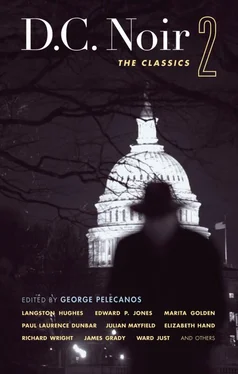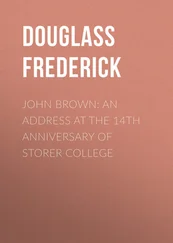Ross Thomas’s witty, urbane political thrillers, several of which take place in our town, are some of the finest Washington novels, regardless of genre, ever written. He wrote knowingly of the backroom deals made in the Federal City, of dinner parties in Georgetown, and of trysts in the Mayflower Hotel and three-martini lunches at Paul Young’s Restaurant, but he could also riff accurately on any neighborhood of the four quadrants. Our selection comes from the novel Cast a Yellow Shadow, published in 1967, one year before the riots, six years after our streetcars had ceased operation. If there was a D.C. Literary Hall of Fame, Mr. Thomas would surely be in it.
Rhozier “Roach” Brown grew up in one of D.C.’s infamous alley dwellings. By his own admission, he came from a third-generation family of hustlers. In 1965, Roach Brown was sentenced to life in prison for his role in a robbery-murder, and alternated his serving time between St. Elizabeth’s Hospital and Lorton Reformatory. While at Lorton, he wrote poetry and conceived of Inner Voices, a prisoner-led theatrical troupe that performed plays written by Brown, one of which was broadcast on National Public Television. In 1975, President Gerald Ford commuted Brown’s sentence to time served. Brown has since been a local television producer, documentary filmmaker, has been appointed to congressional committees, and headed a media production and public relations firm. He was incarcerated again for a parole violation, and is now back out and writing, working with kids, and giving motivational speeches. We present his poem, “Reflecting,” written in solitary at Lorton Reformatory.
I’ll leave you to enjoy these outstanding stories. With pride, and once again with hope and anticipation, here is D.C. Noir 2: The Classics .
George Pelecanos
Washington, D.C.
June 2008
A council of state
by Paul Laurence Dunbar
(Originally published in 1900)
R Street, N.W.
Luther Hamilton was a great political power. He was neither representative in Congress, senator nor cabinet minister. When asked why he aspired to none of these places of honor and emolument he invariably shrugged his shoulders and smiled inscrutably. In fact, he found it both more pleasant and more profitable simply to boss his party. It gave him power, position and patronage, and yet put him under obligations to no narrow constituency.
As he sat in his private office this particular morning there was a smile upon his face, and his little eyes looked out beneath the heavy grey eyebrows and the massive cheeks with gleams of pleasure. His whole appearance betokened the fact that he was feeling especially good. Even his mail lay neglected before him, and his eyes gazed straight at the wall. What wonder that he should smile and dream. Had he not just the day before utterly crushed a troublesome opponent? Had he not ruined the career of a young man who dared to oppose him, driven him out of public life and forced his business to the wall? If this were not food for self-congratulation pray what is?
Mr. Hamilton’s reverie was broken in upon by a tap at the door, and his secretary entered.
“Well, Frank, what is it now? I haven’t gone through my mail yet.”
“Miss Kirkman is in the outer office, sir, and would like to see you this morning.”
“Oh, Miss Kirkman, heh; well, show her in at once.”
The secretary disappeared and returned ushering in a young woman, whom the “boss” greeted cordially.
“Ah, Miss Kirkman, good-morning! Good-morning! Always prompt and busy, I see. Have a chair.”
Miss Kirkman returned his greeting and dropped into a chair. She began at once fumbling in a bag she carried.
“We’ll get right to business,” she said. “I know you’re busy, and so am I, and I want to get through. I’ve got to go and hunt a servant for Mrs. Senator Dutton when I leave here.”
She spoke in a loud voice, and her words rushed one upon the other as if she were in the habit of saying much in a short space of time. This is a trick of speech frequently acquired by those who visit public men. Miss Kirkman’s whole manner indicated bustle and hurry. Even her attire showed it. She was a plump woman, aged, one would say about thirty. Her hair was brown and her eyes a steely grey — not a bad face, but one too shrewd and aggressive perhaps for a woman. One might have looked at her for a long time and never suspected the truth, that she was allied to the colored race. Neither features, hair nor complexion showed it, but then “colored” is such an elastic word, and Miss Kirkman in reality was colored “for revenue only.” She found it more profitable to ally herself to the less important race because she could assume a position among them as a representative woman, which she could never have hoped to gain among the whites. So she was colored, and, without having any sympathy with the people whom she represented, spoke for them and uttered what was supposed by the powers to be the thoughts that were in their breasts.
“Well, from the way you’re tossing the papers in that bag I know you’ve got some news for me.”
“Yes, I have, but I don’t know how important you’ll think it is. Here we are!” She drew forth a paper and glanced at it. “It’s just a memorandum, a list of names of a few men who need watching. The Afro-American convention is to meet on the 22d; that’s Thursday of next week. Bishop Carter is to preside. The thing has resolved itself into a fight between those who are office-holders and those who want to be.”
“Yes, well what’s the convention going to do?”
“They’re going to denounce the administration.”
“Hem, well in your judgment, what will that amount to, Miss Kirkman?”
“They are the representative talking men from all sections of the country, and they have their following, and so there’s no use disputing that they can do some harm.”
“Hum, what are they going to denounce the administration for?”
“Oh, there’s a spirit of general discontent, and they’ve got to denounce something, so it had as well be the administration as anything else.”
There was a new gleam in Mr. Hamilton’s eye that was not one of pleasure as he asked, “Who are the leaders in this movement?”
“That’s just what I brought this list for. There’s Courtney, editor of the New York Beacon, who is rabid; there’s Jones of Georgia, Gray of Ohio—”
“Whew,” whistled the boss, “Gray of Ohio, why he’s on the inside.”
“Yes, and I can’t see what’s the matter with him, he’s got his position, and he ought to keep his mouth shut.”
“Oh, there are ways of applying the screw. Go on.”
“Then, too, there’s Shackelford of Mississippi, Duncan of South Carolina, Stowell of Kentucky, and a lot of smaller fry who are not worth mentioning.”
“Are they organized?”
“Yes, Courtney has seen to that, the forces are compact.”
“We must split them. How is the bishop?”
“Neutral.”
“Any influence?”
“Lots of it.”
“How’s your young man, the one for whom you’ve been soliciting a place — what’s his name?”
Miss Kirkman did her womanhood the credit of blushing, “Joseph Aldrich, you mean. You can trust to me to see that he’s on the right side.”
“Happy is the man who has the right woman to boss him, and who has sense enough to be bossed by her; his path shall be a path of roses, and his bed a flowery bed of ease. Now to business. They must not denounce the administration. What are the conditions of membership in this convention?”
Читать дальше











